2023 Shakedown + EXPRESS West Coast Exploration (EX2301)
April 3 - 27, 2023
Exploration Team
Naming every expedition participant in a telepresence-enabled mission is next to impossible! Many researchers from dozens of institutions across the country have provided input into the expedition plan and are expected to participate. However, we've assembled information about the members of the team who are physically onboard NOAA Ship Okeanos Explorer.
And of course, none of this exploration would be possible without the work of the dedicated NOAA Commissioned Officer Corps and civilians who operate NOAA Ship Okeanos Explorer as part of NOAA's fleet managed by NOAA's Office of Marine and Aviation Operations.
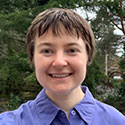
Paige Koenig
Science Co-Lead (Geology), Western Washington University
Paige Koenig is a second-year master’s student in the Geology Department at Western Washington University. She grew up in Denver, Colorado, and received her B.Sc. in environmental science from the University of Redlands. She currently works as a graduate research assistant in the marine geophysics lab studying how small-scale seafloor structures influence natural hazards. Her master’s thesis uses one-meter resolution multibeam acquired from autonomous underwater vehicle Sentry to investigate how the tectonic geomorphology of the Gofar oceanic transform fault influences the seismicity observed there. She currently lives in Bellingham, Washington, and enjoys sea-going activities such as kayaking and polar plunging.

Alexis Weinnig
Science Co-Lead (Biology), U.S. Geological Survey
Alexis Weinnig is a postdoctoral researcher with the U.S. Geological Survey at the Easter Ecological Science Center in Kearneysville, West Virginia. She holds a B.S. in oceanography from Florida Institute of Technology, an M.S. in ecology, evolution, and conservation biology from San Francisco State University, and a Ph.D. in biology from Temple University. This will be Alexis’ second time acting as a Science Lead aboard NOAA Ship Okeanos Explorer, and she has over eight years of experience in deep-sea ecology, with an emphasis in deep-sea coral habitats, population connectivity, and eDNA. Alexis has participated in 14 research expeditions using submersibles, amounting to over 270 days at sea, in the Atlantic, Gulf of Mexico, and Pacific focused on seamount, cold-seep, canyon, and deep-sea coral habitats.

Thomas Morrow
Expedition Coordinator, NOAA Ocean Exploration
Thomas Morrow is a physical scientist with NOAA Ocean Exploration. He spends his time working as an expedition coordinator on NOAA Ship Okeanos Explorer and supporting NOAA’s ocean exploration mission. Thomas is a marine geologist and geophysicist who started his ocean exploration career while earning his bachelor’s degree in geology at the University of Florida. He then moved to the University of Idaho for master’s and doctorate degrees in geological sciences, studying mid-ocean ridges, fracture zones, and hotspot seamounts. Prior to joining NOAA Ocean Exploration, Thomas spent several years as a postdoctoral research fellow at Boston College, coordinating missions to explore the Gofar transform fault on Research Vessel Atlantis and Research Vessel Thomas G. Thompson.
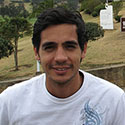
Fernando Aragon
Data Engineer, Global Foundation for Ocean Exploration
Fernando Aragon graduated from the University of Hawai‘i at Manoa with a bachelor’s degree in mechanical engineering. During his studies, he had experience in several fields including conceptual design, aerospace research, mechanical design, robotics and software development. From these activities he was able to intern for NASA at the Jet Propulsion Laboratory, present research at a national conference, and even co-author a technical paper in the Journal of the Astronautical Sciences. His most recent position was at the Field Robotics Laboratory (FRL), where he helped support operations, testing, and software development for two unmanned surface vehicles. From his time in FRL, he discovered a true passion for development and design of robotic systems. Originally from Colombia, Fernando enjoys outdoor activities and currently resides in State College, Pennsylvania.
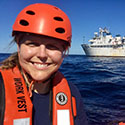
Caitlin Bailey
Video Editor, Global Foundation for Ocean Exploration
Caitlin Bailey became a member of the Global Foundation for Ocean Exploration video team and started sailing aboard NOAA Ship Okeanos Explorer in 2016. She is a “bi-polar” explorer, having been to both the Arctic and Antarctica, as well as a National Geographic Explorer. Caitlin is passionate about wildlife and sharing the deep sea and polar regions with a wide variety of audiences. She has a Master of Fine Arts in science and natural history filmmaking from Montana State University and a Bachelor of Science in animal biology from Texas A&M University-Corpus Christi. When not at sea, Caitlin resides in San Antonio, Texas, where she enjoys SCUBA diving, hiking, and entertaining her labradoodle, Camie.

Roland Brian
Video Engineer, Global Foundation for Ocean Exploration
Roland Brian brings 38 years of electronics and satellite experience, with 29 of those years focusing on television and video engineering specialization. Throughout his early years in television, Roland worked to hone his skills and experience for various television stations and remote broadcasters as well as national broadcasters ranging from CBS, PBS, CNN, CNBC, MSNBC, ESPN, Fox Sports, and the Golf Channel. With a keen eye for precise high-quality, high-definition video, he really enjoys and helps bring the imagery to life for the viewers. Roland began his career in the U.S. Air Force where he worked as a satellite communications engineering technician with visions of working on the U.S. Space Station. He traded in that quest for one of deep-ocean exploration and sharing the beautiful imagery with the world. He has worked with NOAA Ocean Exploration since 2010 and plays an integral part in telepresence-enabled remotely operated vehicle (ROV) expeditions. He has also provided engineering design, integration, and operation services for other projects using various Global Foundation for Ocean Exploration (GFOE) and NOAA Ocean Exploration mobile telepresence systems. His duties aboard NOAA Ship Okeanos Explorer include operation and maintenance of the ship's telepresence and video and satellite systems, including those on ROVs Deep Discoverer and Seirios. Again, Roland’s experience embodies the breadth and depth of knowledge that GFOE and NOAA Ocean Exploration encourage. When not at sea, Roland enjoys life with his wife and family in sunny Sarasota, Florida.
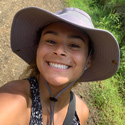
Jennifer Clifton
Contract Mapper
Jennifer Clifton has a bachelor;s degree in environmental studies with minors in coastal management and biology from Eckerd College. She enjoys working on various research and literature review projects conducted under the guidance of her professors. Her areas of interest include marine ecosystems, coastal management, and marine conservation. In her downtime, Jennifer enjoys being outdoors and exploring various nature preserves.
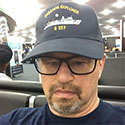
Brian Doros
Video Engineer, Global Foundation for Ocean Exploration
Brian Doros is a television broadcast engineer who was born in Long Branch, New Jersey. Active in sports throughout high school, Brian moved to Southern California and spent the next few years traveling the world surfing and then exploring his technical interests at college in San Diego, California. After changing his course of study to electronics, he focused on broadcast electronics and technical maintenance in broadcasting. His career path first led him to employment at IBM/MCA Video Laser Disc Company in Costa Mesa, California, doing research and development in the early days of optical laser disc, then to Los Angeles, where he specialized in film for television post-production. The next several years were spent working in the Hollywood post-production industry at Paramount Pictures, MGM/Lorimar Telepictures, 20th Century Fox, NFL Films, and Sony Broadcast Company North America, contributing to his 25 years of experience in television post-production and broadcast systems integration. After Hollywood, Brian worked in the field, traveling and upgrading network television facilities to digital broadcasting capabilities during the analog to digital conversion. He now has moved on to less broadcast traditional applications of his background working in his current position.
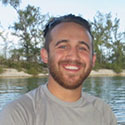
Dan Freitas
Mapping Watch Lead, NOAA Ocean Exploration
Daniel Freitas is from Rochester, New York. He worked for NOAA as a general vessel assistant for over three years in the augment pool while attending Coastal Carolina University, where he studied marine biology and applied mathematics. Over the last eight years, he has worked in the deck, engineering, and survey departments aboard many NOAA vessels before taking a permanent position aboard NOAA Ship Okeanos Explorer for 1.5 years. For the last six years years, he has worked as an independent contractor via the University Corporation for Atmospheric Research on Okeanos Explorer, supporting the NOAA Ocean Exploration mapping team. His time aboard consists of acting as a mapping watch lead, helping train and direct explorers-in-training, and working with the senior survey technician and other crew members to ensure the ship’s operations are completed.
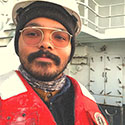
Trey Gillespie
Mapping Watch Lead, NOAA Ocean Exploration
Treyson (Trey) Gillespie lives in Charleston, South Carolina, and has always had a fascination about the natural world, particularly our ocean and its processes. It was due to this intrigue that Trey found marine sciences and pursued a Bachelor of Science in geology and environmental geosciences from the College of Charleston. He is currently working toward a Master of Science in environmental studies from the same institution. During his studies, he has participated in an assortment of internship and field opportunities both domestic and international, including mapping and remotely operated vehicle operations aboard several NOAA ships. Through these experiences, he has gained invaluable knowledge with a wide variety of sonar vessel configurations.

Art Howard
Video Editor, Global Foundation for Ocean Exploration
For more than 30 years, Emmy-award winning photographer and producer Art Howard has helped viewers experience life through images from 50 countries and 7 continents. A native of North Carolina, Art has followed researchers aboard multiple deep-sea missions, documenting the excitement and challenges of exploration. Art uses the latest video technology to bring viewers as close as possible to life at sea, capturing both scientists and the marine life they seek to understand. Art has spent the last 11 years independently producing media for the North Carolina Museum of Natural Sciences.

Sean Kennison
Mechanical Engineer, Global Foundation for Ocean Exploration
Sean Kennison first joined the Global Foundation for Ocean Exploration in 2014 while earning his undergraduate degree at the Pennsylvania State University. He sailed on NOAA Ship Okeanos Explorer as part of the engineering team and assisted with various design projects throughout his senior year. Upon graduating at the top of his class with a bachelor’s degree in mechanical engineering and a minor in engineering mechanics, he joined the team full time. Sean regularly maintains the vehicles and continually works on improvements to keep them up-to-date with technological advances. He has gained invaluable experience and knowledge through the seasons, onshore and offshore, that has turned him into a versatile engineer. Initially starting as a passionate navigator, Sean has grown to become a skilled pilot and is a proven lead for the remotely operated vehicle expedition team.
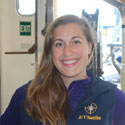
Ashley Marranzino
Benthic Biologist, NOAA Ocean Exploration
Ashley Marranzino is a benthic biologist with NOAA Ocean Exploration. She earned a Bachelor of Science in biology from Regis University and a Master of Science in biological sciences from the University of Rhode Island. Ashley’s research has primarily focused on the sensory biology, morphology, and evolution of deep-sea fishes. After receiving her M.S., Ashley interned with Ocean Exploration Trust (OET) and continued to work as a member of the OET Science Team for several more years prior to joining NOAA Ocean Exploration.
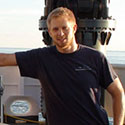
Jon Mefford
Mechanical Engineer, Global Foundation for Ocean Exploration
Jon Mefford holds a bachelor’s degree in aerospace engineering from the University of Texas and a master’s degree in mechanical engineering from the University of Hawai‘i. He began his career working as a software test engineer on the Space Shuttle program for several years before moving to Hawai‘i to pursue his master's degree. During his time as a graduate student, he participated in a number of research expeditions aboard NOAA Ship Okeanos Explorer as a member of the remotely operated vehicle (ROV) team. This experience was invaluable to him as he worked on his degree, which focused on the design, development, and implementation of control systems for marine robotics. Since that time, Jon has spent more than eight years working as a test and integration engineer on the Orion Space Program, occasionally returning to support expeditions with the Global Foundation for Ocean Exploration. He remains passionate about both space and deep-sea exploration and appreciates the many parallels that can be drawn between them. Jon currently resides in Denver, Colorado.
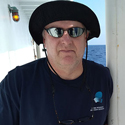
Jim Meyers
Systems Administrator, Global Foundation for Ocean Exploration
Jim Meyers attended Williams College and received a bachelor’s degree in history. He has worked in the information technology field for over 20 years, including 19 years at various positions at Sea Research Foundation in Mystic, Connecticut. He is married with two adult children. Outside of work, he is an avid soccer fan and plans European vacations around match schedules.
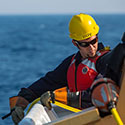
Karl McLetchie
Mechanical Engineer, Global Foundation for Ocean Exploration
Karl McLetchie is a graduate of the Massachusetts Institute of Technology. He holds bachelor’s and master’s degrees in ocean and mechanical engineering. After graduating, he worked as an engineer on the development of autonomous underwater vehicles and as a naval architect on the design of high-speed aluminum vessels. After a two-year stint delivering sailboats around the Caribbean, he started his own contracting company, SeaKnowledge, in 2008. Through SeaKnowledge, Karl works on the mechanical design and operation of underwater vehicles. Karl has worked on NOAA Ship Okeanos Explorer for 11 seasons, in all positions on the remotely operated vehicle (ROV) team from winch operator to ROV team lead. When not on assignment, Karl resides in Pemaquid, Maine.

Bobby Mohr
Electrical Engineer, Global Foundation for Ocean Exploration
Bobby Mohr is a systems/robotics engineer specializing in autonomous and remotely operated underwater vehicles. He holds a bachelor’s degree in physics and graduated cum laude from Davidson College in 2009. Bobby started his career as an engineering technician with Greensea Systems where he was responsible for the design, development, and testing of autonomous underwater vehicle control systems. Bobby realized that he would enjoy the design-build process more if he was able to also pursue the challenges of making vehicles work successfully at sea. After serving on several projects at Greensea, where he specialized in electrical and software systems support, Bobby joined the Global Foundation for Ocean Exploration (GFOE) as an electrical systems engineer. During his time at Greensea and now with GFOE, he has been one of the key electrical engineers on the development of the 6,000-meter-rated remotely operated vehicle system of Deep Discoverer and Seirios.

Lars Murphy
Ocean/Mechanical Engineer, Global Foundation for Ocean Exploration
Lars Murphy holds a bachelor’s degree in ocean engineering and a bachelor’s degree in Spanish from the University of Rhode Island. Growing up on the coast of Maine, he developed a constant pull toward the unknown, the unexplored, and chaotic environments and acquired a drive to bring meaning, understanding, and order to these areas. Lars has a professional background working with autonomous underwater vehicles and other subsea robotics systems both internationally and nationally and now supports remotely operated vehicles Deep Discoverer and Seirios as an ocean/mechanical engineer.
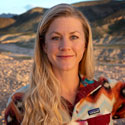
Caitlin Ruby
Sample Data Manager / GIS Lead, NOAA National Centers for Environmental Information
Caitlin Ruby is a data manager with NOAA’s National Centers for Environmental Information through the University of Colorado’s Cooperative Institute for Research in Environmental Sciences. Caitlin always knew she would someday work in the ocean sciences, and has held positions with the Naval Oceanographic Office, NASA, the Naval Research Laboratory, and NOAA. She earned her bachelor's in geography from the University of Southern Mississippi and her master's degree in geospatial sciences from Mississippi State University. Her graduate research focused on improving the geospatial visualization of NOAA Ocean Exploration’s remotely operated vehicle (ROV) video data. Caitlin is thrilled to work with such a wonderful group of data scientists, researchers, and explorers, and always looks forward to watching ROV Deep Discoverer's live video from the deep!

Chris Ritter
Mechanical Engineer, Global Foundation for Ocean Exploration
Chris Ritter first joined the Global Foundation for Ocean Exploration (GFOE) on the Cayman Rise Expedition in 2011, just prior to being hired full time by the Naval Sea Systems Command (NAVSEA). For the next three years, an informal NAVSEA-NOAA relationship allowed Chris to continue to participate in GFOE’s design, engineering, and offshore operations. Chris holds bachelor’s degrees in ocean engineering and aerospace engineering with a minor in mathematics from Virginia Tech. Chris has been a major contributor to GFOE’s design-build process and a tremendous asset to their offshore operations. He is a skilled navigator, pilot, and co-pilot and brings with him a level of enthusiasm that everyone around him appreciates and respects. In late 2014, Chris joined GFOE’s Mechanical Engineering team full time. He is enthusiastic about training the next generation and tackling new projects. Chris resides in Falls Church, Virginia.

Levi Unema
Electrical Engineer, Global Foundation for Ocean Exploration
Levi Unema is an Eagle Scout from Lynden, Washington. He holds a bachelor’s degree in electrical engineering along with a Certificate in Electric Power Engineering from Michigan Technological University. Levi joined the Global Foundation for Ocean Exploration (GFOE) in 2016 and designs, builds, operates, and maintains GFOE’s remotely operated vehicles. Since joining the team, he has acquired many technical skills in the satellite communication field, in addition to the broadcast video field. Levi sails on most remotely operated vehicle expeditions on Okeanos Explorer, satisfying the roles of electrical engineer, navigator, pilot, co-pilot, and sometimes VSAT (Very Small Aperture Terminal) engineer. Levi resides in Newport, Rhode Island.

Chris Wright
Data Engineer, Global Foundation for Ocean Exploration
Chris Wright holds a Bachelor of Science in business administration from the University of Mary Washington and a Master of Business Administration from Rollins College. After graduation, he worked as a network and systems administrator and engineer in the hospitality industry in the Northeast and Mountain West for more than 15 years. Recently relocating back to the East Coast, Chris joined the Global Foundation for Ocean Exploration (GFOE) data team in early 2019 as one of the newest members of the organization. In 2019, he completed his first expedition aboard NOAA Ship Okeanos Explorer and is extremely excited about continuing the journey to explore the oceans around the world. When he isn't sailing on Okeanos Explorer, he’s busy working in GFOE’s Quonset office planning, designing, and implementing data solutions to help refine and mature its base of operations for ocean exploration. Chris and his family currently reside in Newport, Rhode Island.